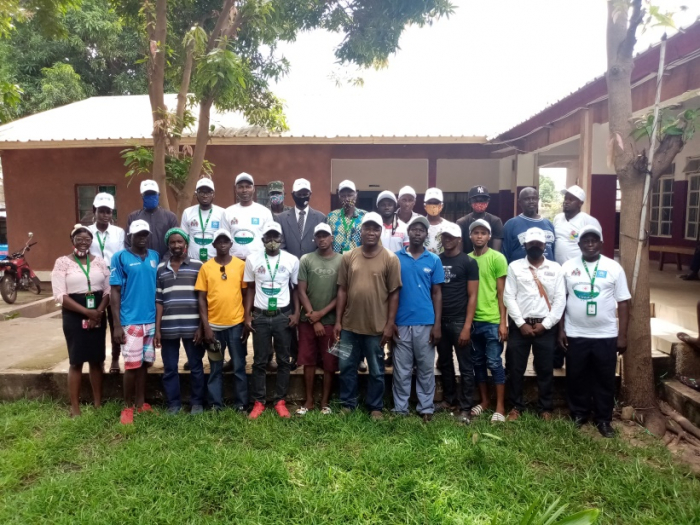
The conclave which was held at the conference hall of Basse Area Council, covered different topics ranging from environmental safety of flammable refrigerants, identification of unsafe conditions, storage, transportation, usage & handling of flammable refrigerants and principles of equipment operation especially the new recovery machine and vacuum. Also taught at training dialogue covered evacuation of recovery machine, recovery kits connection and procedures.
As part of the training exercise and as well as a practical ground, over 25 air conditioning units and systems were serviced at Basse Regional Health Centre as a goodwill gesture.
Samba Bah, the Governor of Upper River Region disclosed in his opening remarks that the “training on Ozone Depleting Substances (ODS) is very important and timely as Environmental issues are currently a global concern. We therefore need to learn from each other particularly on environmental matters that affect all of us.” He pointed out.
The emission of controlled refrigerants like Hydro-Chloro-Fluoro-Carbons (HCFCs) according to Governor Bah, do not only deplete the ozone layer but also contribute to the warming of the earth. He further disclosed that the said refrigerants are used in offices, fish processing factories, hotels, etc. to name but a few. “As technicians therefore, you have a stake in the fight against the consumption of such refrigerants. I hope by the end of day-three of the training, you would have learnt a lot about how to use the said refrigerant during the servicing of your refrigeration and air conditioning systems”. Governor Bah challenged the technicians.
In declaring the training workshop open, Governor Bah called on the participants to share the knowledge learnt with other technicians who did not have the opportunity to be present. He further used the opportunity to thank the NEA on behalf of President Adama Barrow for organising such an important workshop in his Region. He finally challenged the participants to keenly pay attention and actively participate during the deliberations.
Dr. Dawda Badgie, the Deputy Executive Director of the National Environment Agency disclosed that his agency has been partnering with technicians for a long time in the protection and preservation of the Ozone layer.
“The Ozone Layer is a very important resource in the stratosphere protecting life on earth from Ultra Violet B Radiation. When exposed to UVB we can develop skin cancer. Our immune system is suppressed, the marine creatures are affected, the fact that their food stuff known as phytoplankton is destroyed and the photosynthetic process in plants is also retarded leading to low yields,” Dr. Badgie explained.
He said the training aimed at building capacity on how to collaborate as refrigeration and air conditioning technicians in the fight against the depletion of the Ozone Layer; share knowledge on HCFC phase-out and HFC phase down activities, and strengthen information network on trading and consumption of refrigerants within the region. “It is important to note that as technicians you are a major stakeholder in this fight so we really need your support.
During the three day training you will be updated on the progress made by the Ozone Project particularly on the phasing out of Ozone Depleting substances and indeed on new challenges of phasing out HCFCs which is part of the Hydro-Chloro-Fluoro-Carbon Phase-out Management plan (HPMP). HCFCs are mainly used in our fish processing factories, in hotels, households and offices to name but a few. These refrigerants have a potential in warming the earth and at the same time contribute to the depletion of the Ozone Layer.”
Momodou Mendy, senior lecturer from GTTI, who led the training process, revealed that “some of you have already attended similar training programmes but you still need to know that new technologies are emerging and alternative refrigerants are also being introduced and tested in our markets. Your customers including us would count on you on the safety use of such refrigerant as some of them are highly flammable.”




